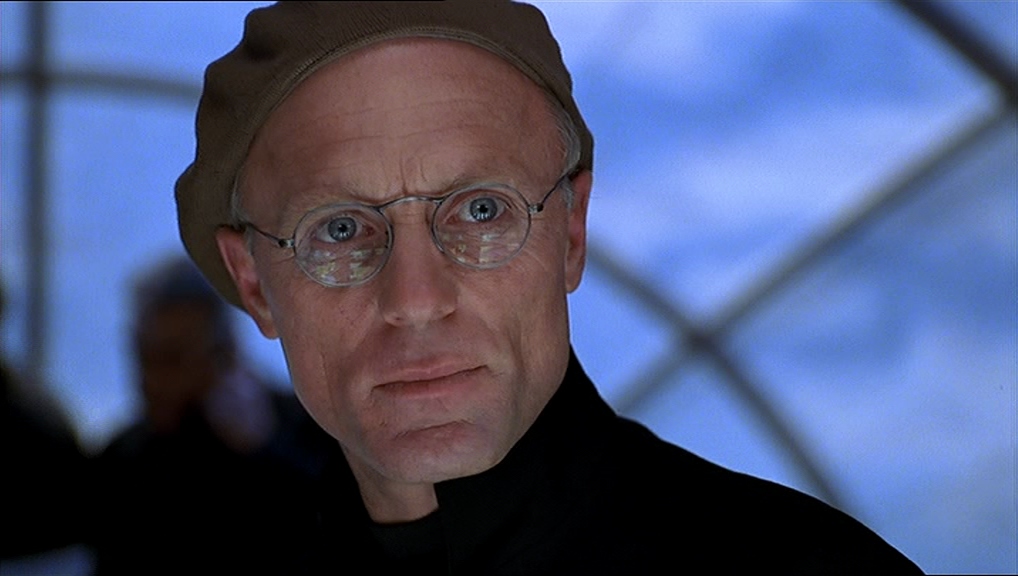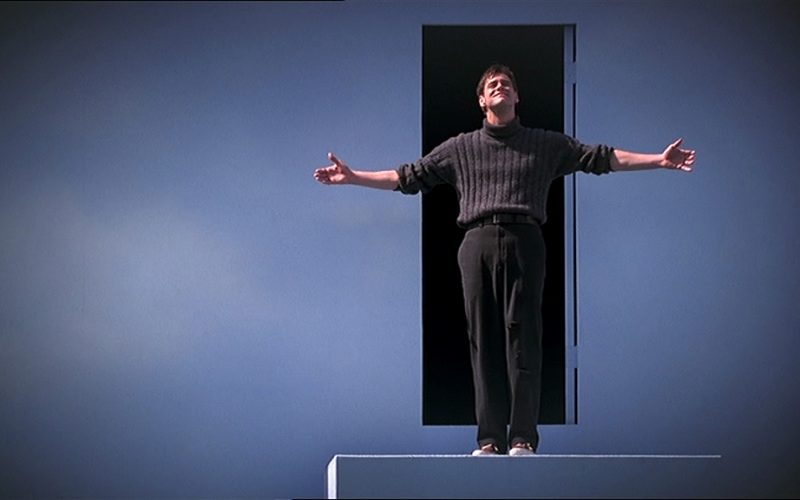The Truman Show (1998) – A tale of Reality TV told when it was still just fantasy.
*** SPOILER WARNING ***
One of the most significant themes in film history involves the questioning of reality, of what is real. It’s a sub-genre of film which crosses various main genres with ease, limited only by the filmmaker’s imagination. From horror to sci-fi, to comedy, action and musicals. In 1920 German audiences questioned whether the murders of Dr Caligari and his somnambulist were real or just the frenzied imaginings of a deranged mind. Then in 1939 Dorothy awoke from her trip to Oz to discover that the whole thing had all been a dream. In 1999 Neo discovered that what he thought was the real world was nothing more than an intricate computer programme called The Matrix and reality was a dystopian nightmare. A year before in Dark City, Rufus Sewell discovered that the city in which he lived was being changed and manipulated every night by a mysterious group of aliens. These are just a few examples but there are many, many more.
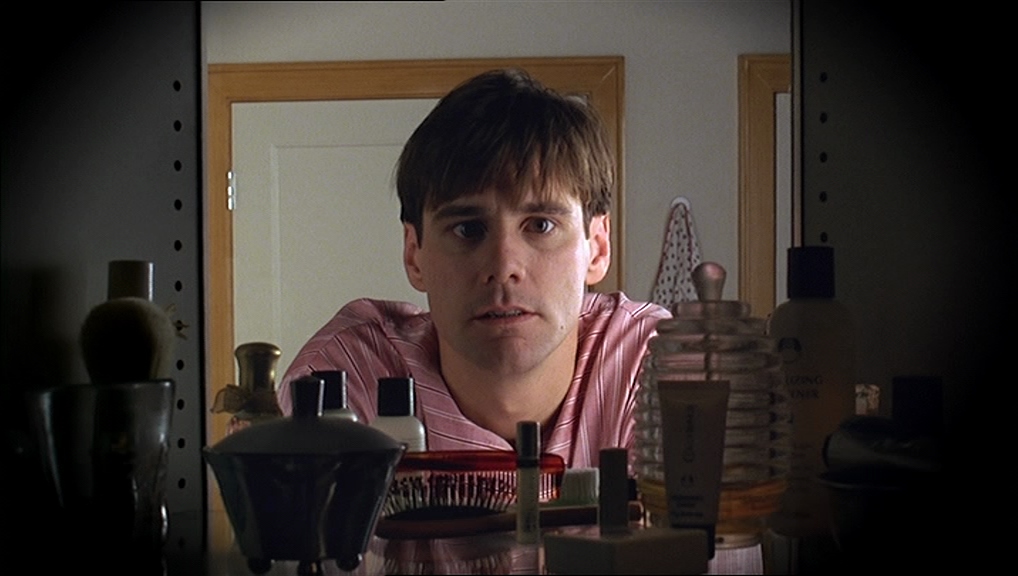
It’s a question which gets to the heart of who we are – explorations into our psyches and ids which have changed with our culture, expressing the existential problems of each new decade and detailed by the different technologies available to the filmmaker at the time of production. This may explain why these films are perhaps more common in the last twenty years than at any other time in cinema history, especially in the mainstream. The reason for so many similar films in the late nineties probably relates to the pre-millennial anxiety many people in the world were feeling at the time.
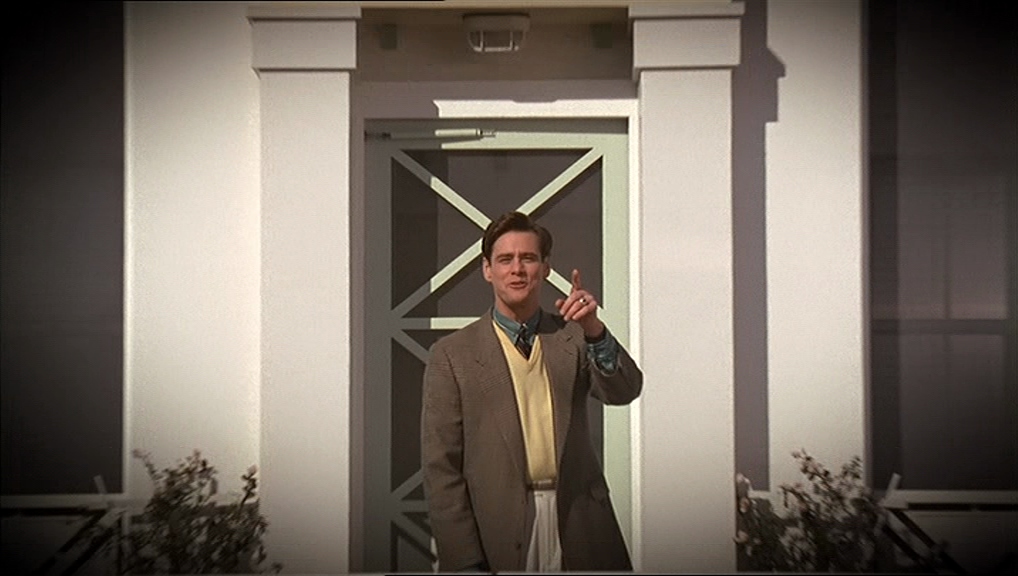
One of the reasons that such films are so popular and powerful may be because the one sense that we rely on most is vision and film has always been primarily a visual medium. Yes, the written word, which can be more personal as it relies on the imagination of the individual reader, can open up worlds and construct lives in a way that film can sometimes struggle with, but nothing beats seeing the ‘real’ thing on screen. Imagine the difference between reading Arthur Conan Doyle’s The Lost World and watching dinosaurs come to life in King Kong (1933). Film is constantly pushing both the visual and the cultural boundaries of what we accept, often reflecting the fears, anxieties and existential questions of who we are. In doing so, the result is almost cathartic, if only because it brings forth ideas that have not yet been elaborated.
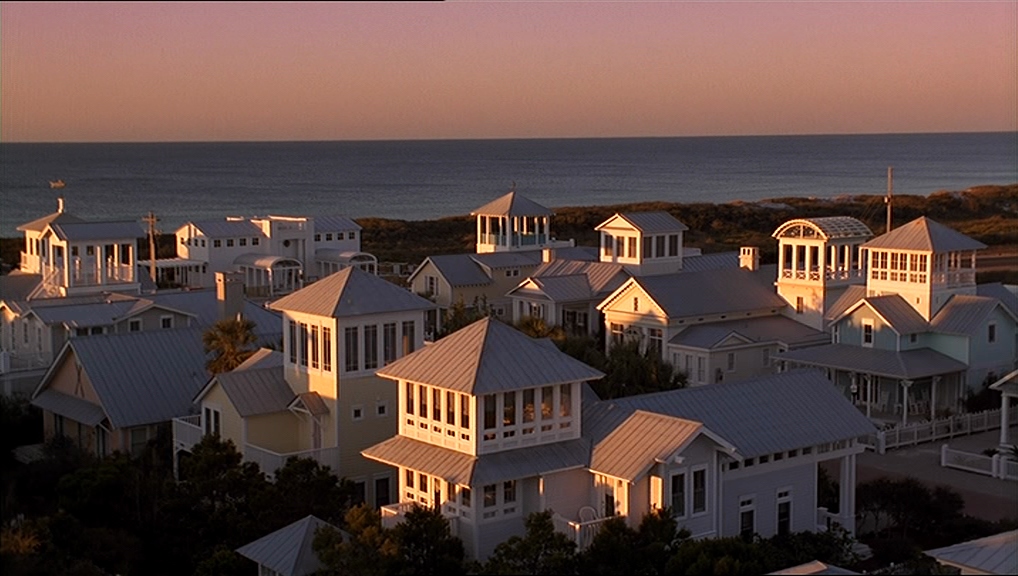
One of the best examples of this is Peter Weir’s comedy/drama The Truman Show. Released twenty years ago in 1998, the same year as Dark City and one year before The Matrix, The Truman Show is about a fictional TV series which follows the life of one man – Truman Burbank – who lives in an entirely artificial world.
On the face of it, The Truman Show seems to have more in common with Ron Howard’s film Ed TV (1999) than any of the science fiction epics mentioned, but this is not the case. Ed TV chronicles a reality TV show in which its protagonist – Ed (Matthew McConaughey) – is fully aware of the cameras around him. The drama and the comedy comes from the knowledge that Ed knows that whatever he does and whatever he says will be broadcast to the world. This is one of the teachings of the film – Ed comes to realise the consequence of his actions and his words. Truman, on the other hand is unaware as to what is happening to him, just as Neo is in The Matrix or John Murdoch is in Dark City. In both these films, the protagonists begin to slowly suspect that there is something wrong with the world they know and ultimately, they discover the truth. The same is true of Truman Burbank.
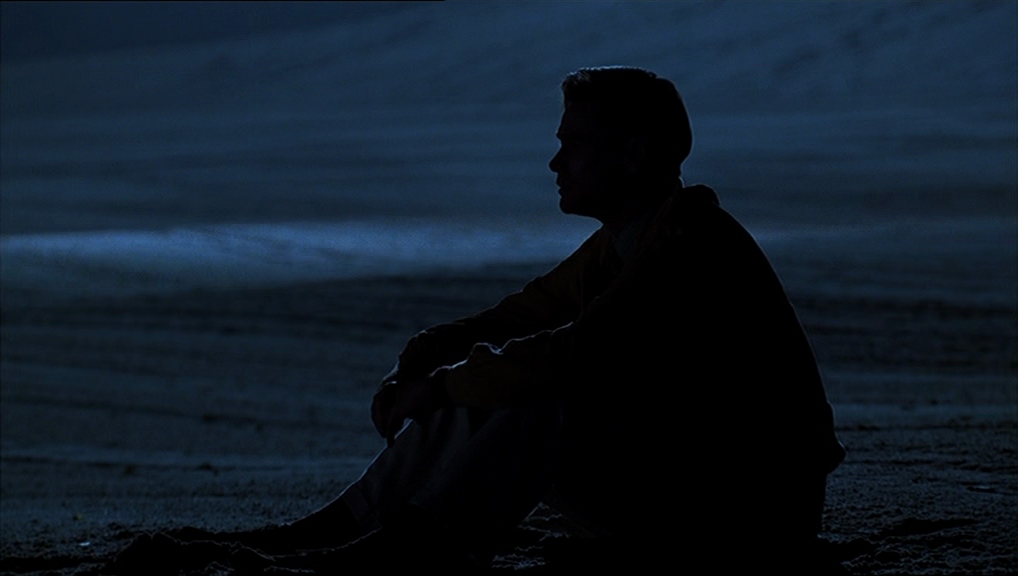
The Truman Show started with the birth of a baby, one of five candidates with Truman being selected simply because he was born the closest to the transmission date of the pilot episode. As he starts to grow his life is broadcast to the world. His first steps, his first tooth, his first girlfriend, are all highlights of the show which, by the time we are introduced to Truman, has aired for the last 30 years.
The seeds of suspicion start when Truman falls for Lauren (Natascha McElhone), a student in his school. The problem is, Lauren (whose real name is Sylvia) hasn’t been cast as Truman’s girlfriend. That job has gone to Hannah Gill (Laura Linney) who plays Meryl. Although Truman and Meryl become a bit of an item he’s still secretly attracted to Lauren but when they meet one day and run off to the beach, Lauren is whisked away by someone claiming to be her father and Truman is left all alone. The only explanation he is given is that Lauren, who tries to tell him that the whole thing is a fraud, ‘has episodes’ and they are moving to Fiji.
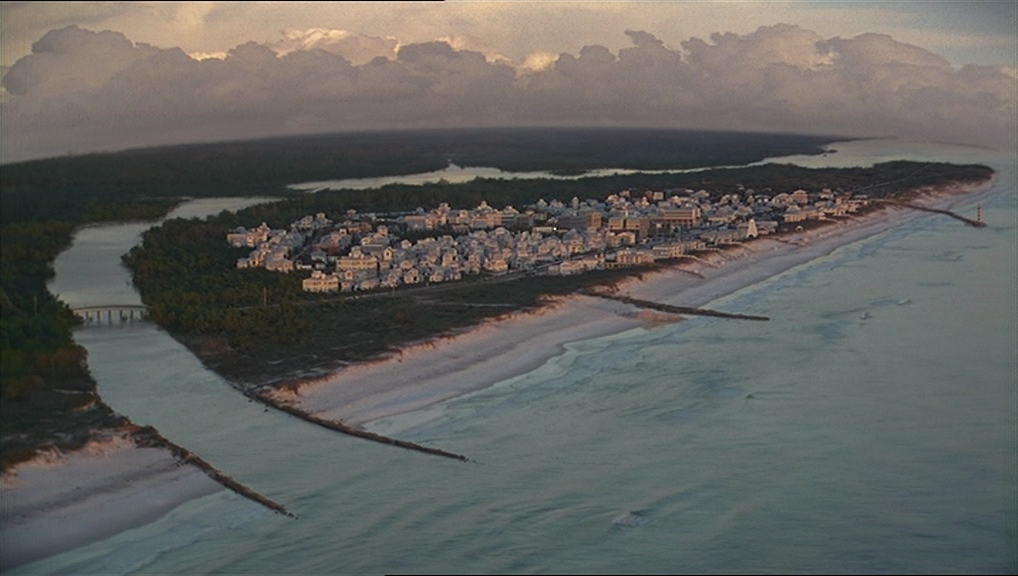
This, and a myriad other little instances, would normally have been enough to raise an average person’s suspicions but as the show’s creator, Christof (Ed Harris) explains;
“We accept the reality of the world with which we’re presented. It’s as simple as that.“
In order to create the reality of a TV show director Peter Weir uses a multitude of techniques designed to replicate the various cameras and angles – including button cameras, cameras hidden on the side of a bin, even one in a pencil sharpener – and although he doesn’t stick to these techniques throughout, you really do get a sense of voyeurism.
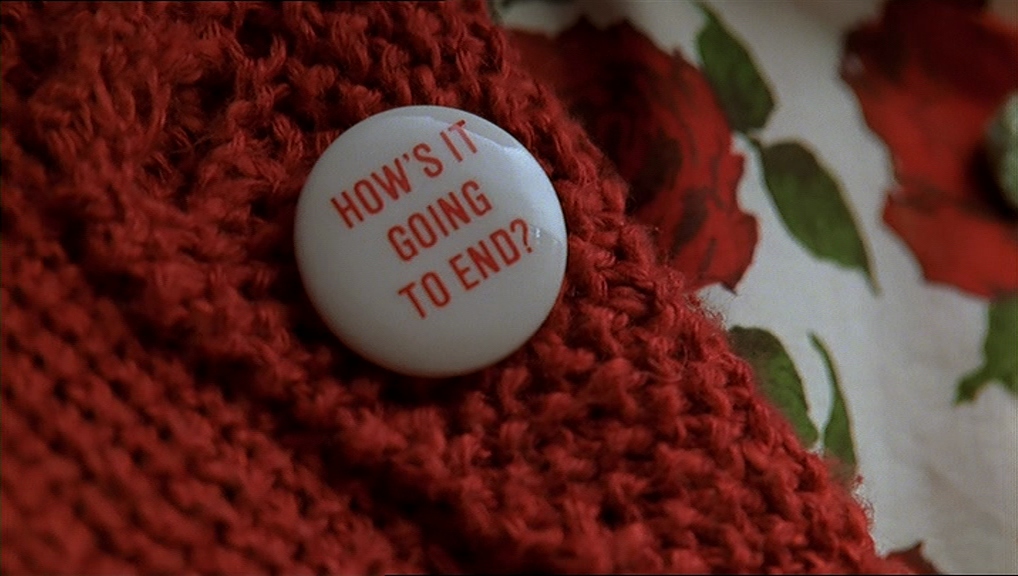
There are many themes in The Truman Show which reflected the late 1990s and beyond. The massive increase in the implementation and use of CCTV, the sense that we are being constantly spied upon (this was 15 years before Edward Snowden revealed the truth about the extent that this was actually happening) and the feeling that maybe we are not entirely in control of our own lives – but the most disturbing is undoubtedly the feeling of being subjected to an almost constant, unconsented voyeurism.
The show is broadcast 24 hours a day and at night we get close-up images of Truman sleeping peacefully, unaware of the fact that he’s being watched. Whilst The Truman Show is not a horror (which it could easily have been) it still manages to convey this ever pervading eeriness.
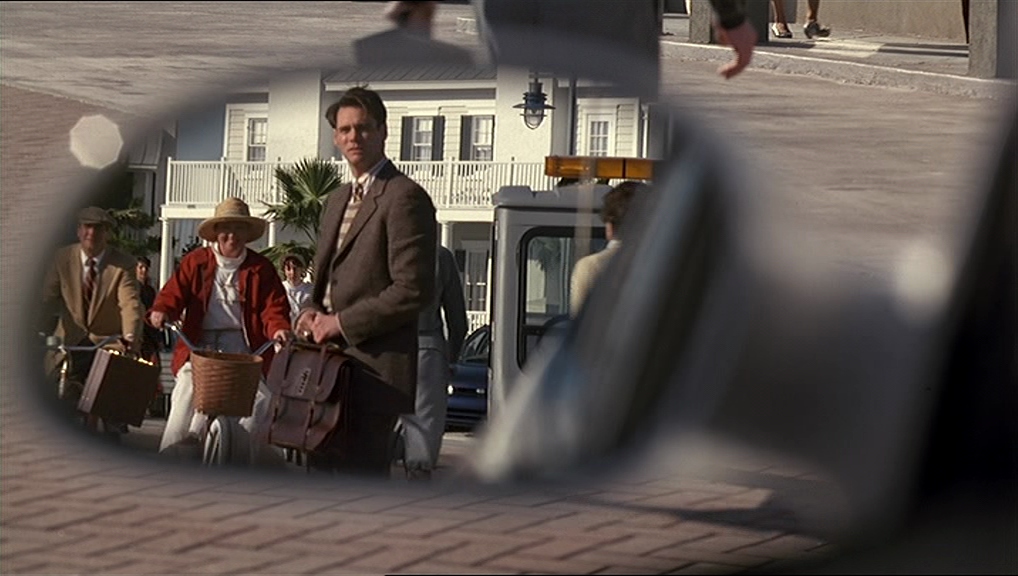
Christof’s role in all this is to provide justification for this confinement and Ed Harris plays the role as if he truly loves his creation. He watches Truman sleep at night, his hand stroking the screen like a parent stroking a baby’s cheek. However, what he is doing is a form of abuse. In order to keep Truman’s worldview as narrow as possible, Christof orchestrates a series of devices designed to instill fear in his charge. One of the storylines of the past was the death, at sea, of Truman’s father; the blame for which was put squarely and cruelly on Truman’s shoulders. The result of this is that he has a debilitating fear of water which is especially relevant and convenient given that he lives on an island. When he tries to book a flight to Fiji Truman is surrounded by posters promoting the dangers of flying. One involves an aeroplane being struck by lightning with the warning, “IT COULD HAPPEN TO YOU!!”
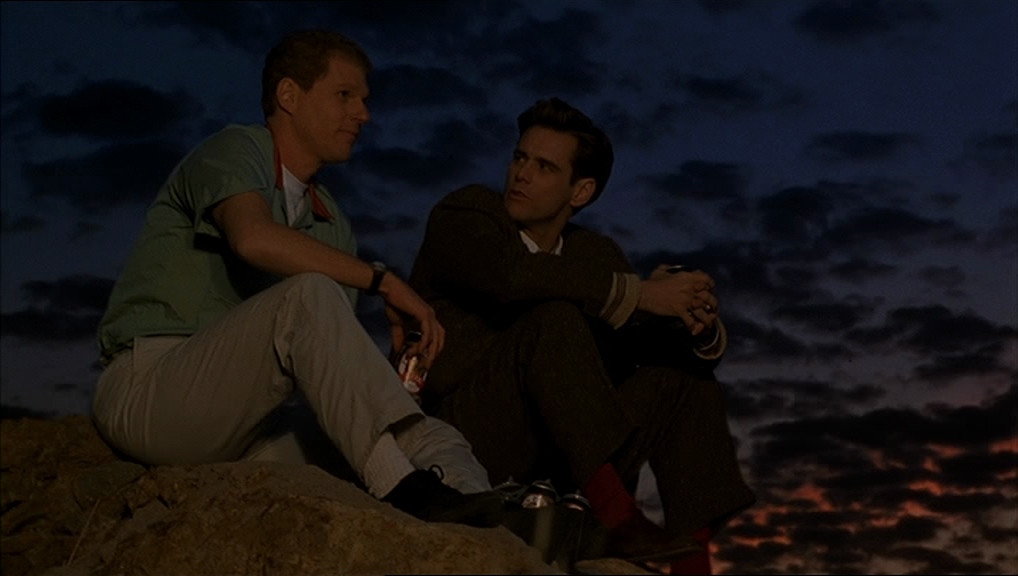
It’s no doubt a form of psychological abuse, something that is overlooked by the viewing populace who Weir cuts to throughout the film in various settings – two old ladies on a sofa, a middle aged man in a bath tub and a bar full of people. Indeed, there is little concern expressed by these viewers, apart from being caught up in the drama of the show. We are also shown Sylvia, waiting at home egging Truman on.
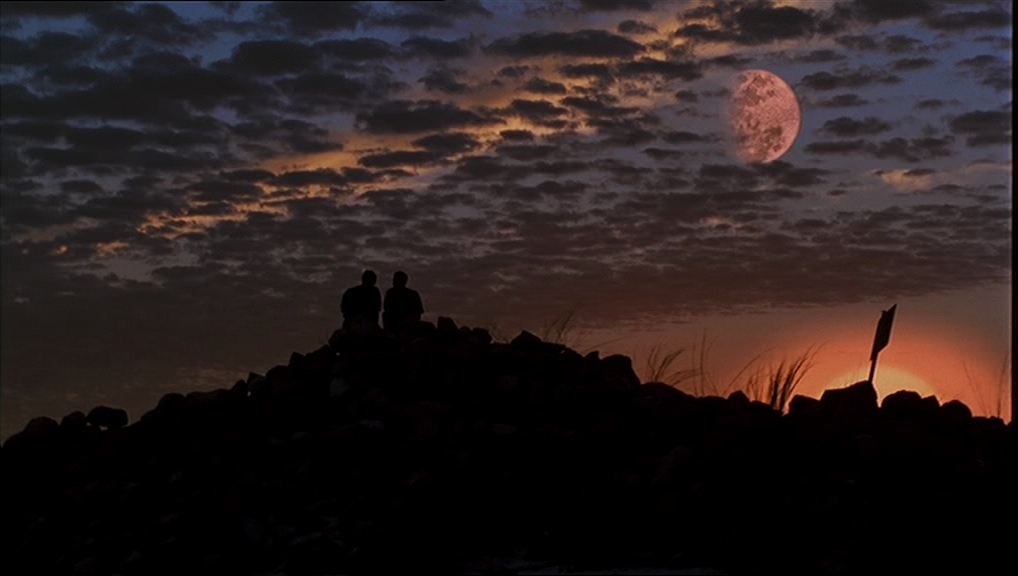
The core of The Truman Show is of course Jim Carrey. This was the first major straight role for Carrey. It’s not the most natural performance but then again, the character is not a natural personality. He is in many respects an artificially created one. If we are all the products of our environments then it’s entirely in keeping with the premise of The Truman Show that there’s something artificial about Truman. Carrey dials back on his usual over the top expressions and facial distortions although the artifice is still there, especially in his ‘Good Afternoon, Good Evening and Good Night,’ catchphrase. There’s a perfectly crafted blending of realism and artifice throughout, aided in no small part by some truly brilliant production and set design. This artifice is also evident in our character’s clothes and the faux, 1950’s styling on display that playfully pays homage to the wholesome family sitcoms of eras past.
A big part of Carrey’s performance hinges on this innocence, although it’s difficult to marry this image of a man-child with a sexually active grown man. This is a facet of the show which is not really explored. One of the viewers does mention that whenever Truman and Meryl have sex, the camera pans away and music is played, and later, Christof states that he wishes to capture the first reality TV conception. Beyond this, there’s nothing said of Meryl and Truman’s sex life.
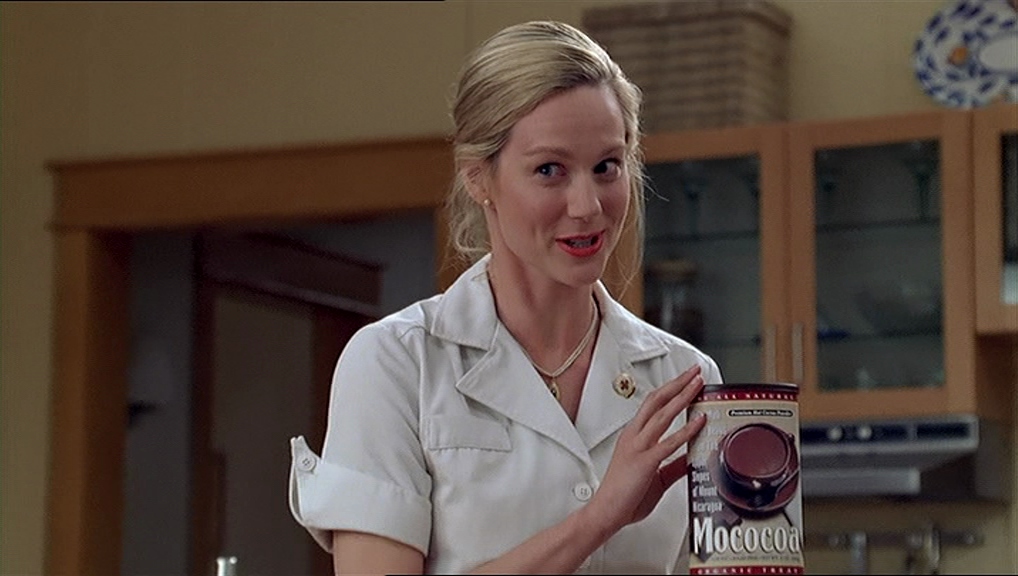
This is an interesting aspect which could have done with more exploring, after all, Meryl is an actress, willingly (like everyone else) taking part in the confinement of this innocent man and is also willing to have sex with this him knowing that millions of people will be watching. Later, when the stress of watching Truman unravel gets too much for Meryl, a replacement is quickly found. Of course, sex on realty TV is probably not unusual but the major difference is that in these cases both parties are aware of the situation and are voluntarily taking part.
But, in many respects, Truman has to be the innocent, even if it is to help our suspension of disbelief and help us relate to a situation so absurd. It’s hard for an audience to relate to a character who shows all the indications of being street-wise and savvy without understanding the truth of their imprisonment and manipulation.
It may have been interesting to witness more of the dark side of what is essentially a form of abuse, but that film wouldn’t have likely struck a chord with audiences at the time. This is the reality of show business.
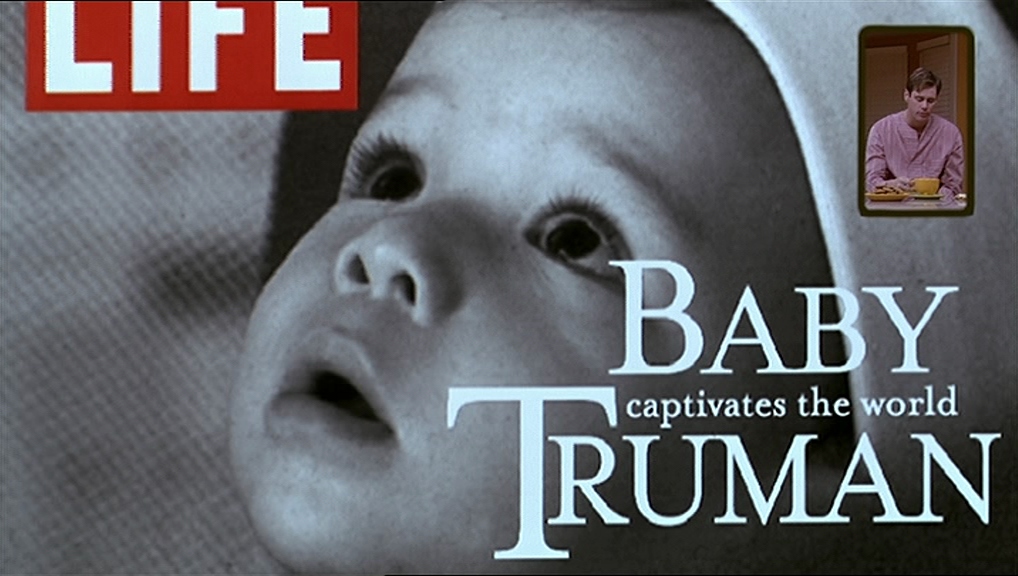
So, The Truman Show does make compromises but it is still a wonderfully entertaining film. The darkness is still there and the fact is that Truman Burbank is such a well conceived character and, at the end, we really are rooting for him. I watched it with my 11 year old daughter who was on the edge of her seat when Christof turns on the storm, an indication of the primal cathartic release people of all ages get when watching a good movie. The music, by Burkhard Dallwitz, is stirring and the cinematography by Peter Biziou is gorgeous, helping perfectly maintain that careful balance of believable artifice. It’s all held together by Carrey’s stellar central performance and the ending the film builds to is wonderfully satisfying yet also fittingly ambiguous.
At the very end when the transmission finally ceases, the viewers just shrug and turn the channel over. It’s as if the last 30 years of programming were completely disposable. However, you can’t help but wonder what type of life Truman will have on the outside. As Christof says, he has the most recognisable face on earth, and you can’t help but wonder if, for Truman himself, it has all come to an end.
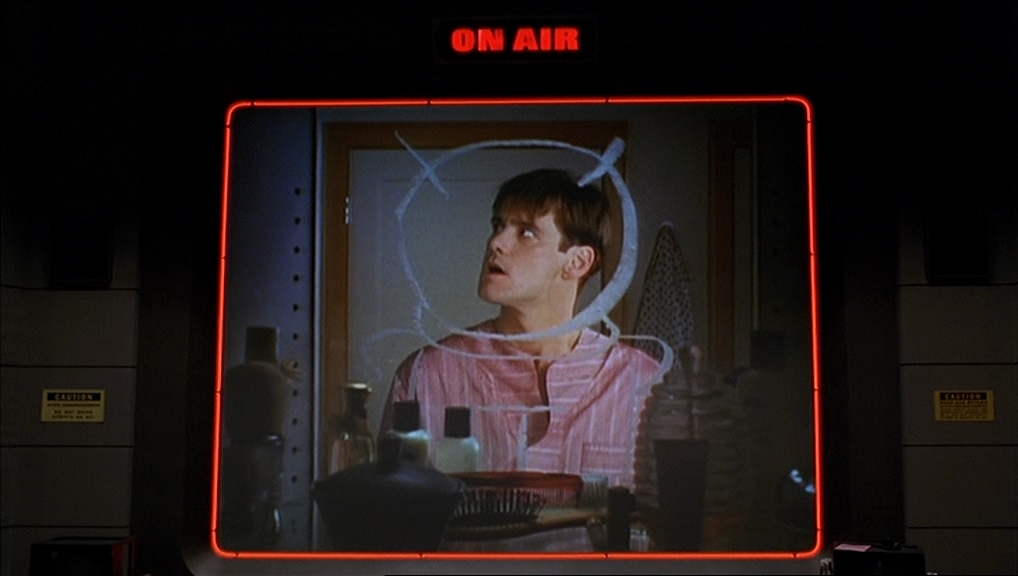
The Truman Show is a film that grows more relevant with each passing year and rewards multiple viewings especially because of the darkness that is constant throughout but which never takes over. In this respect it’s similar to Forrest Gump – another film that seems very light on first viewing but actually has a rather dark underbelly. Weir’s film is unique in that it lays bear and analyses the morality of a concept that had yet to come to fruition. Yet today, 20 years on, Reality TV is one of the most popular forms of easily digestible, throwaway entertainment for the masses. Whilst the wholly immoral subjugation of a baby, who would grow before the eyes of a global audience into a grown but still confined man is a bit of a stretch even for some of today’s less scrupulous showrunners, it nevertheless has a lot to say about the idea of watching everyday people going about the same lives we do in an often artificial premise or situation. 20 years ago the very concept of The Truman Show was one bordering on satirical science-fiction. Yet little did we know back then how incredibly prescient and relevant a film it would become as the very concept it portrayed was born and grew into a global entertainment phenomenon watched by millions, just like the fictional Truman Show itself. It’s indeed a case of art imitating life in reverse and therefore a piece of clever, prophetic filmmaking unlike any other.
Film ‘89 Verdict – 8/10
